Mehdi Hassan’s life

Mehdi Hassan
The Sultan or Shahensha Of Ghazal and The Spirit of Sacred Music
Mehdi Hassan or ( Hasan ) as an artiste has earned the kind of acclaim that few in light classical world have witnessed, but his attributes most of this to an unflinching faith in God and of course a deep respect for his art that has got him the fame and adulation.
Mehdi Hassan is undoubtedly one of the most renowned ghazal singers in the world today. An artiste, who has set such towering standards in the light classical music, his career is used as a benchmark along which many young artistes model their own.
Background
Mehdi Hassan never had a formal education. His education was solely in the field of classical music that he had been studying since the age of eight. Born ( 1927 ) in a village called "Luna" in Rajasthan (India), Mehdi Hassan trained under his father Ustad Azeem Khan and uncle Ustad Ismail Khan. He hails from family that produce fifteen generations of musicians making him the "solva pusht" (sixteenth generation) of artists, with an ancestry that boasts of "Darbari Ustads" who were seasoned performers in the courts of several Maharajahs of Indore, Patna, Chhatarpur and Mysore.
Career
Mehdi Hassan produced his first public performance at the age of eight at the behest of the Maharaja of Baroda. Since then he has had nearly 25,000 records to his credit and has rendered nearly all forms of vocalism including classical, thumri, film music and of course the ghazal that he is most widely reputed for.
Residing in Pakistan, this artist has earned worldwide acclaim for several innovations made to the ghazal style. It was in 1952 that he sang classical vocal for radio Karachi and in 1955 launched himself into the world of ghazal. His deep, sonorous voice and superb vocal control while rendering challenging raga-based compositions have been his greatest strengths. This coupled with the fact that he brought forth the poetry of ghazal with impeccable perfection are some of the others reasons for creating memorable pieces such as "ranjish hi sahi", "baat karni mujhe mushkil", "ghazab kiya tere wade pe" and "gulon mein rang bhare".
A celebrated maestro of Ghazal rendition, Mehdi Hassan's standing in the world of Ghazal Gayeki is next only to Begum Akhtar. Mehdi Hassan inherited the art of music as it ran in the family.
His father, Ustad Azim Khan was an exceptional exponent of the Indian Classical Music of his time and, because of his talent, was in the service of the Maharaja of Jaipur. It was he who tutored Mehdi Hassan in Classical Music from and early age.
Under the specialist training of his father, Mehdi Hassan could rapidly master, at a tender age, a range of styles of vocal music incluiding Dhrupad, Khayal, Thumri and Dadra.
He began his professional career as a radio artist of classical music and later on switched over to Ghazal Gayeki. This branching out brought in incredible success and popularity to him and soon enough he became the Sultan or Shahensha of Ghazal Gayeki.
Mehdi Hassan's velvety voice couple with his relaxed and poised style of rendition creates a magic charm and listener is transferred to an ethereal plane. He is very meticulous in choosing Ghazals and expressing the correct intonation of the diction. Since he has a dependable Clasical Music background he can intertwine his Gayeki in highly specialized ragas and yet make his rendition popular among all section of Ghazal lovers.

Mehdi Hassan is probably the most complete ghazal singer ever. An outstanding vocalist, Mehdi Hassan has been a big name in Pakistan since the 50's singing various film and non-film ghazals. In 1952, he sang classical music on Radio Karachi and in 1955 launched himself into the musical rendition of ghazal, an art which has become his main forte. His chief characteristic is the relaxed and assured style of his presentations.
His deep husky voice respondet with pathos is one of the most moving experiences for music lovers. He has tremendous control over all the technical ragas which he renders in his ghazals with incomparable dexterity. His ever-popular ghazals include among others "Ranjish hi Sahi". "Baat karni mujhe mushkil", "Ghazab kiya tere waade pe" and "gulon mein rang bhare". He has won the respect of all his fans and contemporaries alike.
Jagjit Singh, in his "Ghazal ka Safar" candidly declarates "Hamare is safar mein sab se behtreen fankar wohi (Mehdibhai) hain". Mehdi Hassan continues to enthrall his fans with his magic and his concerts are always eagerly awaited by music lovers.
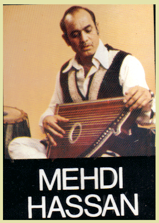

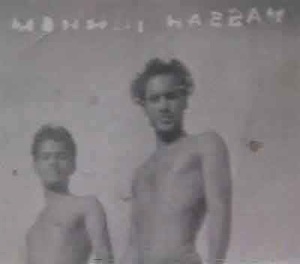
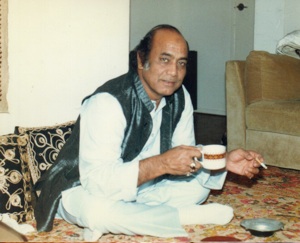
Family the next generation
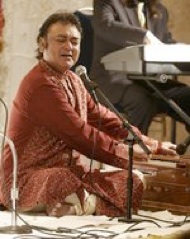
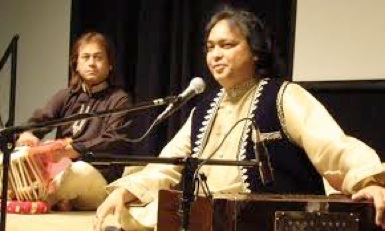
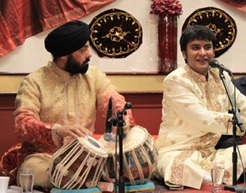
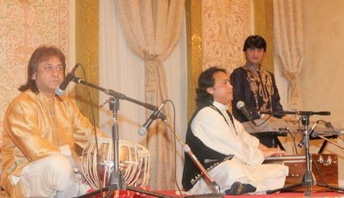
Asif Hassan
Imran & Kamran Hassan
Faizan Hassan
Imran, Kamran & Faizan Hassan
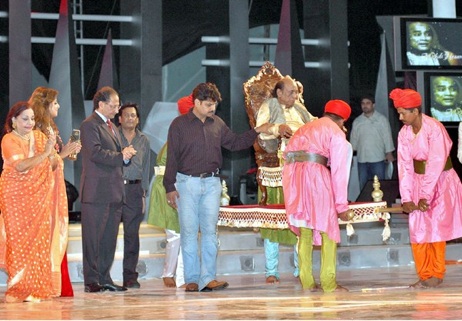
Ustad Mehdi Hassan in Toronto
Ustad Mehdi Hassan is a Father of 14 children (9 Sons)&(5 Daughters). Some of his sons inherited the family knowledge of music and followed the footsteps of Ustad Mehdi Hassan and each son made music as their career.
1.Tariq Mehdi Hassan (Versitile Playback Singer)
2.Arif Mehdi Hassan (Classical Tabla Player & Promoter)
3.Asif Mehdi Hassan (Playback & Ghazal Singer)
4.Kamran Mehdi Hassan (Playback & Ghazal Singer)
5.Imran Mehdi Hassan (Classical Tabla Player & Versatile Singer)
6.Faizan Mehdi Hassan (Versatile & Ghazal Singer).
Ustad Mehdi Hassan’s grandsons the 18th generation of Kalawant Decedents
1.Adnan Hassan
2. Ali Hassan
3.Salman Hassan
4.Nawaz Hassan
5.Wali Hassan
Jashan-e-Mehdi Hassan
Was a tribute to Ustad Mehdi Hassan from Pakistan Film & Television Academy and all well-known artists participated in this Historical Event for The Legend.
